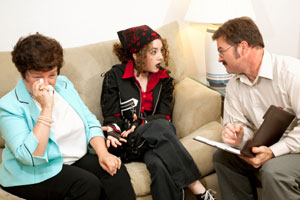Primary Sources: Do Treatments for Drug Abuse Also Reduce Mental Health Problems Among Runaway Youth?
 “Change in Parent- and Child-Reported Internalizing and Externalizing Behaviors Among Substance Abusing Runaways: The Effects of Family and Individual Treatments.” Forthcoming from Journal of Youth and Adolescence. Posted online September 2012.
“Change in Parent- and Child-Reported Internalizing and Externalizing Behaviors Among Substance Abusing Runaways: The Effects of Family and Individual Treatments.” Forthcoming from Journal of Youth and Adolescence. Posted online September 2012.
What it’s about: Researchers wanted to know whether certain types of psychotherapy would reduce mental health issues among runaway and homeless youth with drug and alcohol problems. They recruited 179 young people ages 12 to 17 from an emergency shelter in a Midwestern city.
Young people received one of three different types of therapies: motivational interviewing, the community reinforcement approach, and ecologically-based family therapy. The researchers surveyed the participants for 2 years, at 3-month intervals. They also talked to parents or guardians about the youths’ change in behavior over time.
Why read it: The three interventions studied by the researchers have been shown to reduce alcohol and drug use. But until this study, researchers had not tested how well they work on depression, anxiety and other mental health problems common among runaway and homeless youth.
Biggest takeaways for youth workers: Providing any of the three therapies to homeless youth and their guardians appears to improve communication and family mental health, making it possible for young people to return home. The authors found that all three groups of youth reported significant relief from anxiety and mood disorders, but the young people participating in ecologically-based family therapy had the best results at the end of the study period. Conduct disorders and substance use also dropped in all three groups, but at the end of the study, ecologically-based family therapy and motivational interviewing appeared to have the longest lasting results.
Because runaway and homeless youth often face several issues--for example, anxiety and substance abuse--and each evidence-based treatment may be better at helping youth with particular problems, the authors recommend that youth workers consider combining several treatments. They write that the three treatments described in this study may be promising choices for that kind of "integrated" approach.
Additional reference: For more insight on putting motivational interviewing and other evidence-based practices into use in runaway and homeless youth shelters, read the NCFY interview "What's the Best Way to Train People to Use Evidence-Based Practices?" or listen to the companion podcast.
(Publications discussed here do not necessarily reflect the views of NCFY, FYSB or the Administration for Children and Families. Go to the NCFY literature database for abstracts of these and other publications.)


 Sign up
Sign up Follow us
Follow us Like us
Like us Sign up for our RSS feeds:
Sign up for our RSS feeds: 

